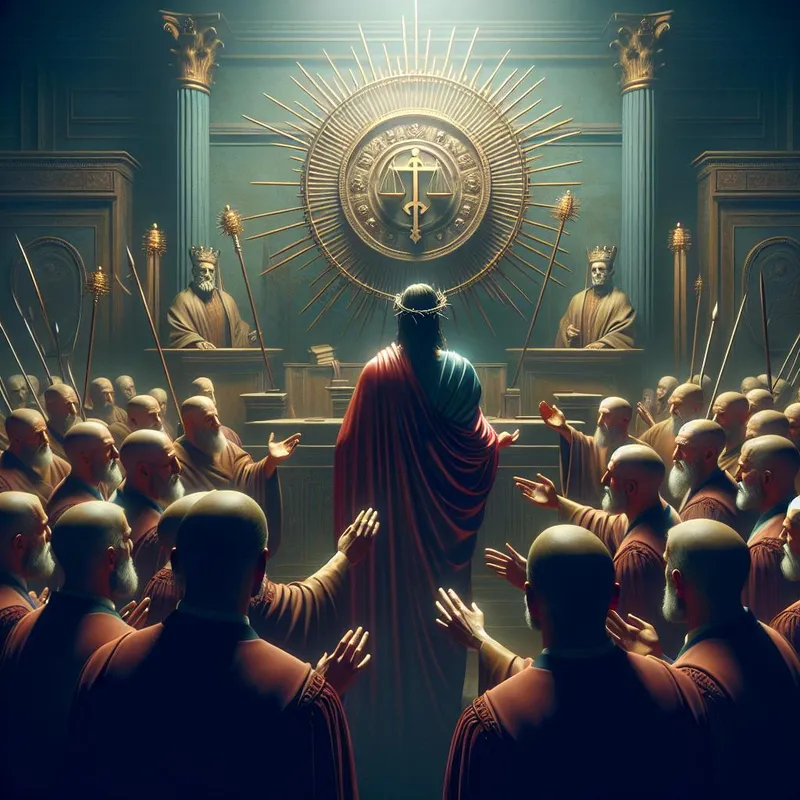
'The Divine Trials: Unveiling the Journey of Jesus'
Posted on 10 July 2024
Trials of Jesus
The trials of Jesus were a series of legal proceedings that took place before both Jewish religious authorities and Roman officials. These trials ultimately led to Jesus' crucifixion. Let's explore the key points of these trials to gain a better understanding of their significance.
1. Religious Trials
Jesus' religious trials consisted of three stages. First, He was brought before Annas, the former high priest, who questioned Him about His disciples and His teachings (John 18:19-24). Next, Jesus faced Caiaphas, the current high priest, and the Sanhedrin, an assembly of religious leaders. In these trials, Jesus was charged with blasphemy for claiming to be the Son of God and the Messiah.
These religious trials demonstrated the extent of the Jewish leaders' hatred towards Jesus, as they disregarded many of their own laws. Several illegalities occurred during these trials based on Jewish law. For example, trials were not supposed to be held during feast time, but Jesus' trial took place during Passover. Additionally, each member of the court was meant to vote individually to convict or acquit, but Jesus was convicted by acclamation. The Jewish leaders also had no authority to execute anyone, and trials were not meant to be held at night. Despite these violations, Jesus was found guilty and sentenced to death.
Why This Matters
Understanding the religious trials helps us see how Jesus faced unjust treatment from those who should have upheld justice and fairness. It highlights the opposition and hatred He encountered from the Jewish religious leaders, which ultimately led to His crucifixion.
Think About It
Consider the significance of Jesus being charged with blasphemy for claiming to be the Son of God and the Messiah. How does this reflect His divinity and the fulfillment of Old Testament prophecies?
2. Roman Trials
Following the religious trials, Jesus was taken before Roman authorities. The first Roman official Jesus faced was Pilate, the Roman Governor (John 18:28). Pilate found no reason to put Jesus to death but sent Him to Herod, hoping to avoid responsibility in the matter (Luke 23:7). Herod ridiculed Jesus and then sent Him back to Pilate (Luke 23:11–12).
Pilate made several attempts to release Jesus, as he did not believe He deserved death. He offered the prisoner Barabbas to be crucified instead of Jesus but was met with the crowd's demand for Jesus' crucifixion. Pilate eventually yielded to the pressure and handed Jesus over to be crucified.
3. Illegalities in the Trials
Throughout both the religious and Roman trials, several illegalities occurred that violated Jewish and Roman law. These illegalities further demonstrate the injustice surrounding Jesus' trials.
In the religious trials, there were violations of Jewish law such as holding a trial during a feast, not allowing sufficient time before carrying out the death penalty, and not providing proper legal representation for the accused. Additionally, self-incriminating questions were asked of Jesus, which was not allowed.
In the Roman trials, Pilate found no legitimate reason to execute Jesus but succumbed to political pressure from the crowd. This goes against Roman legal principles and reveals how injustices prevailed during these proceedings.
Why This Matters
The illegalities in Jesus' trials highlight the flawed human systems of justice that failed to recognize His innocence. They serve as a reminder of the fallen nature of humanity and our need for a perfect and just Savior.
Think About It
Reflect on how the illegalities in Jesus' trials reveal the corrupt nature of human institutions and our desperate need for God's justice and redemption.
4. Scourging and Crucifixion
Before Jesus was crucified, Pilate had Him scourged as a final attempt to appease the Jews and secure His release. Roman scourging was a brutal punishment that involved severely whipping the accused, often causing significant pain and damage to the body.
Despite Pilate's attempts to have Jesus released, the crowd insisted on His crucifixion. Pilate eventually gave in to their demands and handed Jesus over to be crucified.
5. Mockery of Justice
The trials of Jesus represented the ultimate mockery of justice. Jesus, who was the most innocent man in history, was found guilty of crimes He did not commit and sentenced to death by crucifixion.
The religious trials demonstrated the Jewish leaders' animosity towards Jesus, as they violated their own laws and disregarded fairness and justice. The Roman trials revealed how political pressures influenced the decision-making process, leading to an unjust outcome.
6. Significance
The trials of Jesus hold immense significance in Christianity. They highlight the lengths to which Jesus was willing to endure injustice and suffering for the sake of humanity's redemption. Despite the flawed human systems of justice, Jesus willingly laid down His life on the cross to offer forgiveness and salvation to all who believe in Him.
Why This Matters
Understanding the trials of Jesus helps us grasp the depth of God's love for us and the sacrificial nature of Jesus' mission on Earth. It reminds us that even in the face of injustice, we can find hope and redemption through our faith in Him.
Think About It
Reflect on the profound implications of Jesus' willingness to endure unjust trials and ultimately give His life for our salvation. How does this inspire you to respond in your own life?
